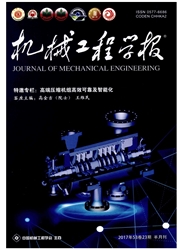

 中文摘要:
中文摘要:
智能桁架结构作为一种控制结构一体化的新型空间结构,具有几何、物理可自调性,但这类结构同时具有柔性大、阻尼小、低频模态密集、模态耦合程度高以及存在多种不确定性和耦合等特点,给振动控制带来很大挑战。基于此,研究如何基于扩张状态观测器和非线性状态误差反馈设计不依赖于模型的自抗扰振动控制器。采用扩张状态观测器实时估计对象模型摄动及外扰的总和作用量,并在控制信号中补偿掉,实现不确定非线性系统的动态补偿线性化。针对线性的"积分器串联型"对象,设计非线性状态误差反馈控制律。对不确定参数空间83杆智能桁架结构进行自抗扰振动控制仿真研究。结果表明在外部扰动或模型结构参数发生变化时,自抗扰振动控制器仍可以获得理想的控制效果,具有很好的适应性和鲁棒性。
 英文摘要:
英文摘要:
Intelligent truss structures, as a new kind of integrated control-structures, have the adaptive geometry and physics characteristics, but these structures also have the complex dynamic characteristics, such as large flexibility, small structure damping, closely low order modes, high degree of mode coupling, uncertainties, and coupling, which brings a great challenge to active vibration control of intelligent truss structures. Therefore, it is studied how to design the model-independent active disturbances rejection vibration controller (ADRVC), based on the extended state observer (ESO) and the nonlinear state error feedback control law (NLSEF). The real-time dynamic linearization of the uncertain nonlinear system is implemented by disturbance estimation via ESO and disturbance compensation via the control law. A NLSEF is designed to control the linear integrator-cascaded type plant. The ADRVC is used for the vibration control of an 83-bar space intelligent truss structure with uncerta in-but-bounded parameters. The simulation results demonstrate the ADRVC has good adaptability and robustness to external disturbance and unknown variation in plant parameters.
 同期刊论文项目
同期刊论文项目
 同项目期刊论文
同项目期刊论文
 Modal analysis of rubbing acoustic emission for rotor-bearing system based on reassigned wavelet sca
Modal analysis of rubbing acoustic emission for rotor-bearing system based on reassigned wavelet sca Hidden Markov Model-Based Fault Diagnostics Method in Speed-up and Speed-down Process for Rotating M
Hidden Markov Model-Based Fault Diagnostics Method in Speed-up and Speed-down Process for Rotating M Symmetrical characteristics of the workspace for spatial parallel mechanisms with symmetric structur
Symmetrical characteristics of the workspace for spatial parallel mechanisms with symmetric structur Dynamic analysis of rotor's radial rub-impact in full degrees of freedom accounting for turborotor's
Dynamic analysis of rotor's radial rub-impact in full degrees of freedom accounting for turborotor's nternet/Intranet Based Remote Condition Monitoring and Fault Diagnosis scheme and System for Steam T
nternet/Intranet Based Remote Condition Monitoring and Fault Diagnosis scheme and System for Steam T A Novel Constrained Genetic Algorithm for the Optimization of Active Bar Placement and Feedback Gain
A Novel Constrained Genetic Algorithm for the Optimization of Active Bar Placement and Feedback Gain An interval parameter perturbation method for predicting the natural frequency bounds of intelligent
An interval parameter perturbation method for predicting the natural frequency bounds of intelligent A Comparison Study of Improved Hilbert-Huang Transform and Wavelet Transform: Application to Fault D
A Comparison Study of Improved Hilbert-Huang Transform and Wavelet Transform: Application to Fault D Fault Diagnosis Based on Support Vector Machines with Parameter Optimization by Artificial Immunizat
Fault Diagnosis Based on Support Vector Machines with Parameter Optimization by Artificial Immunizat A nonlinear model of flow-structure interaction between steam leakage through labyrinth seal and the
A nonlinear model of flow-structure interaction between steam leakage through labyrinth seal and the Cost-effective updated sequential predictive maintenance policy for continuously monitored degrading
Cost-effective updated sequential predictive maintenance policy for continuously monitored degrading Statistically planned and individually improved predictive maintenance management for continuously m
Statistically planned and individually improved predictive maintenance management for continuously m Fault Recognition Method for Speed-Up and Speed-Down Process of Rotating Machinery Based on Independ
Fault Recognition Method for Speed-Up and Speed-Down Process of Rotating Machinery Based on Independ Synthesis of Rectilinear Motion Generating Spatial Mechanism with Application to Automotive Suspensi
Synthesis of Rectilinear Motion Generating Spatial Mechanism with Application to Automotive Suspensi Integrated optimization design of active vibration control system for piezoelectric intelligent trus
Integrated optimization design of active vibration control system for piezoelectric intelligent trus Feasibility study of structural damage detection using NARMAX modelling and Nonlinear Output Frequen
Feasibility study of structural damage detection using NARMAX modelling and Nonlinear Output Frequen Application of support vector machine based on pattern spectrum entropy in fault diagnostics of roll
Application of support vector machine based on pattern spectrum entropy in fault diagnostics of roll Effects of anti-symmetric nonlinear viscous damping on the force transmissibility of multi-degree of
Effects of anti-symmetric nonlinear viscous damping on the force transmissibility of multi-degree of 期刊信息
期刊信息
